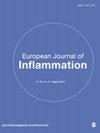Phytic acid regulates proliferation of colorectal cancer cells by downregulating NF-kB and β-catenin signalling
IF 0.8
4区 医学
Q4 IMMUNOLOGY
引用次数: 0
Abstract
Phytic acid (PYT) also known as inositol hexakisphosphate or inositol polyphosphate has shown a broad range of biological effects including anti-inflammatory, antioxidant, and anticancer effects in several preclinical studies. This study aimed to investigate the effects of PYT in vitro on HCT116 and HT-29 cell lines and to analyse the intricate mechanism of NF-κB-β-catenin signalling pathways. Both cell lines were treated with PYT, and analysed for cell viability, apoptosis, progression of cell cycle, and DNA fragmentation. Gene and protein expression analysis was performed to assess the molecular mechanism. PYT suppressed the proliferation of colorectal cancer cell lines in a dose- and time-dependent manner with an estimated IC50 value of 2.96 and 3.35 mm, respectively. PYT caused cell cycle arrest at the G2/M phase in both CRC cell lines and induced mitochondrial intrinsic apoptosis via activation of caspase-9 and caspase-3 cascade. PYT suppressed the expression of pro-inflammatory markers especially COX-2 and iNOS, and IL-lβ, IL-6, and IL-10. Analysing the mechanism behind the effects of PYT showed that it suppressed the levels of NF-κB and β-catenin and inhibited the levels of cyclin Dl and c-Myc (its downstream targets) and COX-2. The results collectively indicate the potent anti-inflammatory and anti-proliferative effects of PYT in CRC cell lines that were mediated by downregulating the β-catenin and NF-κB signalling pathways. Results advocate that natural supplementation of PYT can be an effective preventive approach in controlling cancer of colorectal region.植酸通过下调NF-kB和β-catenin信号传导调节结直肠癌细胞的增殖
在几项临床前研究中,Phytic acid(PYT)也被称为六磷酸肌醇或多磷酸肌醇,显示出广泛的生物学作用,包括抗炎、抗氧化和抗癌作用。本研究旨在研究PYT在体外对HCT116和HT-29细胞系的影响,并分析NF-κB-β-连环蛋白信号通路的复杂机制。用PYT处理两种细胞系,并分析细胞活力、细胞凋亡、细胞周期进展和DNA片段。进行基因和蛋白质表达分析以评估分子机制。PYT以剂量和时间依赖的方式抑制结直肠癌癌症细胞系的增殖,估计IC50值分别为2.96和3.35mm。PYT在两种CRC细胞系中均导致细胞周期停滞在G2/M期,并通过激活胱天蛋白酶-9和胱天蛋白酶-3级联诱导线粒体固有凋亡。PYT抑制促炎标志物的表达,尤其是COX-2和iNOS,以及IL-1β、IL-6和IL-10的表达。对PYT作用机制的分析表明,PYT抑制NF-κB和β-catenin的水平,并抑制细胞周期蛋白D1和c-Myc(其下游靶点)以及COX-2的水平。这些结果共同表明,PYT在CRC细胞系中具有强大的抗炎和抗增殖作用,这是通过下调β-连环蛋白和NF-κB信号通路介导的。结果表明,PYT的自然补充是控制癌症的一种有效的预防方法。
本文章由计算机程序翻译,如有差异,请以英文原文为准。
求助全文
约1分钟内获得全文
求助全文
来源期刊
CiteScore
0.90
自引率
0.00%
发文量
54
审稿时长
15 weeks
期刊介绍:
European Journal of Inflammation is a multidisciplinary, peer-reviewed, open access journal covering a wide range of topics in inflammation, including immunology, pathology, pharmacology and related general experimental and clinical research.

 求助内容:
求助内容: 应助结果提醒方式:
应助结果提醒方式:


